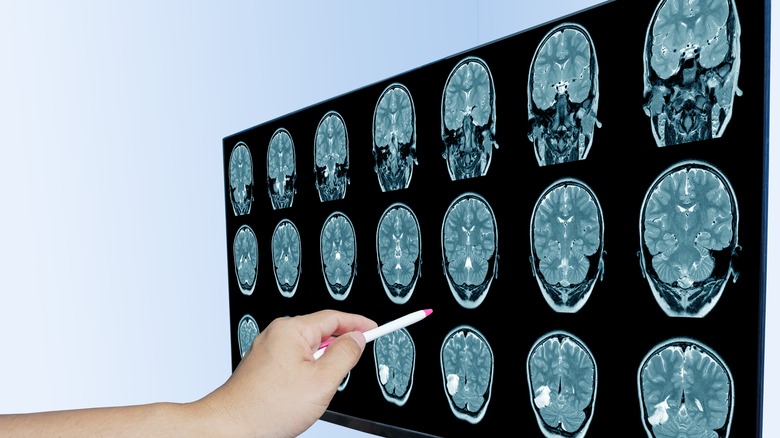What Causes Aphasia?
Aphasia is a brain disorder that causes a person to have difficulty speaking or understanding the speech of others (via Cleveland Clinic). This disorder impairs the ability to communicate with others since the parts of the brain that control language expression and comprehension have become damaged.
The condition typically affects people in mid-to-old age, and both men and women are equally likely to be diagnosed, according to Johns Hopkins Medicine. While aphasia is often referred to as a condition that affects a person's verbal speech, it can also impact a person's ability to write and read (per Verywell Mind). The ways in which speech is processed, understood, and produced can all become distressed when a person suffers from aphasia.
It is crucial to note that aphasia is not a disease. It is a disorder that is caused when there is damage to the brain, which usually occurs abruptly but can also progress over time, according to the Centre for Neuro Skills.
The reasons aphasia impacts language
According to Verywell Mind, the dominant hemisphere of the brain, typically the side of the brain opposite a person's dominant hand, commands language function. Within the dominant hemisphere of the brain, there are several parts that contribute to language capabilities. There is the frontal lobe, which controls cognitive functions, the parietal lobe, which governs sensory perception, and the temporal lobe, which controls the processing of memories and contains the primary auditory cortex (via Science Direct).
When aphasia is a result of damage to the temporal lobe, a person is usually diagnosed with a form of fluent aphasia (per Centre for Neuro Skills). A common sign of fluent aphasia is when a person will say long sentences with seemingly random words. If the brain damage occurs in the frontal lobe, then a person is likely to be diagnosed with a form of non-fluent aphasia, which is noticeable when a person can say short, coherent sentences but produces them with a great deal of effort. Within fluent and non-fluent aphasia, there are numerous specific types of aphasia depending on exactly where the brain damage has occurred. Medical tests and imaging can help determine exactly where brain damage has occurred.
Causes of aphasia
The most common cause of Aphasia is stroke, which can cause blood vessels within the brain to rupture or become blocked and result in the loss of blood to the portions of the brain that control speech, according to Mayo Clinic. When blood flow to the brain is inhibited, brain damage can occur and lead to aphasia.
While stroke is the most frequent genesis of Aphasia, other causes can include a traumatic brain injury (TBI), infection within the brain, and a tumor that grows and blocks blood flow to parts of the brain that control language (per Centre for Neuro Skills). Stroke and head injury are two ways that aphasia is typically brought on suddenly, while tumors can grow slowly and prompt symptoms of aphasia to appear over time. Of course, there is no absolute way to know exactly how aphasia will be caused as each source of the condition and each person's experience are unique.
Aphasia can also be caused by dementia, but aphasia itself is not a form of dementia (via Stroke Association). Rather, aphasia can be a symptom of dementia as the parts of the brain that control speech deteriorate and become damaged over time.



